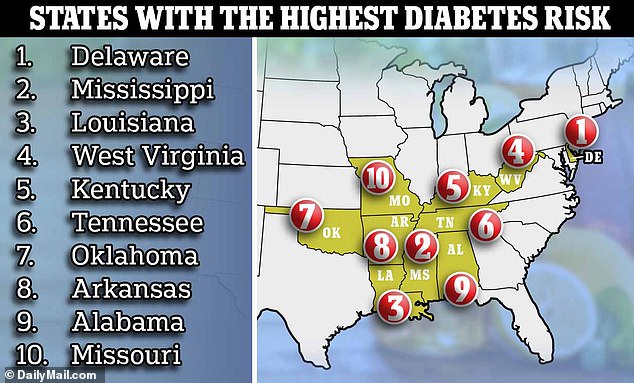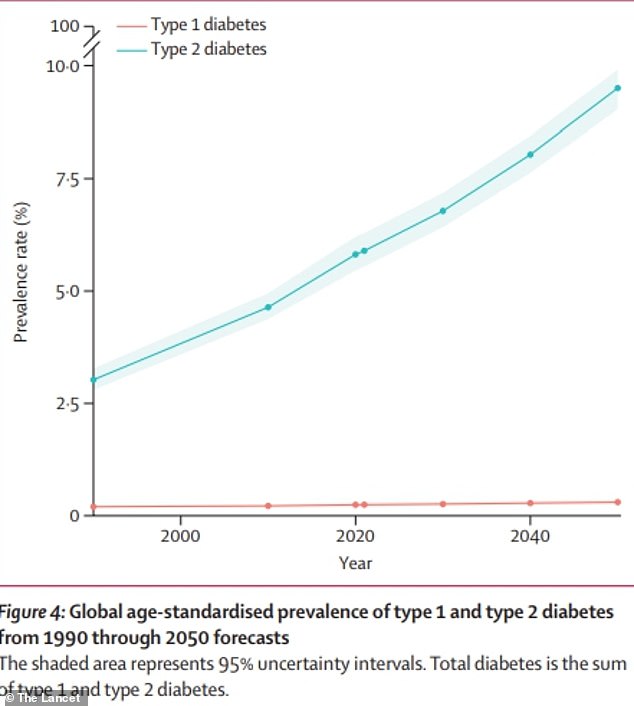Children who contract Covid are at risk of a much deadlier disease years later
Children infected with Covid may be more likely to develop diabetes, a study suggests.
Researchers in Ohio evaluated more than 600,000 American children and teens infected with Covid or an unrelated respiratory disease.
The team found that children and teenagers with Covid were up to 60 per cent more likely to develop type 2 diabetes than children and teenagers with other respiratory infections.
They noted that this could be due to Covid disrupting their metabolism or causing cells in the pancreas to not produce enough insulin, which could lead to diabetes.
Children and teenagers infected with Covid may be more likely to develop type 2 diabetes, researchers from Case Western Reserve University in Ohio found (stock image)
However, the study only looked at correlation and not causation, meaning the findings do not prove that Covid causes type 2 diabetes.
Overweight children were even more likely to develop diabetes after contracting Covid.
And the team noted that some of these cases were already lurking before the participants became ill with Covid, and diabetes was discovered while they were being treated for Covid.
“However, a substantial proportion of cases follow infection,” they wrote.
But surprisingly, even children who were not overweight were up to 60 percent more likely to develop diabetes compared to children with other respiratory conditions.
The findings come as diabetes increases in the US and Britain, which experts have attributed to rising obesity rates and greater access to ultra-processed foods.
According to the CDC, approximately 34 million Americans have been diagnosed with type 2 diabetes, and just over 5,000 of them are under the age of 19.
The new study from Case Western Reserve University in Ohio looked at data from 613,602 children and teens between the ages of 10 and 19 between January 2020 and December 2022.
Half of the participants had been diagnosed with Covid at some point during the study, while the other half had contracted an unrelated respiratory illness, asthma, pneumonia or bronchitis.
In each group, approximately one in 200 participants was overweight or obese.
The average age was 15 years and the majority of participants (57 percent) were white.
Researchers checked diabetes risk at three different intervals: one, three and six months after being diagnosed with Covid or another respiratory disease.
This was done by looking at A1C levels, which measure the average glucose in the blood.
The researchers found that children and teenagers infected with Covid were 55 percent more likely to develop type 2 diabetes one month after infection than children and teenagers with other respiratory diseases.
That risk dropped slightly to 48 percent after three months, before rising to 58 percent after six months.
And those who were overweight or obese were twice as likely to develop diabetes one and three months after infection compared to those with other respiratory conditions.
After six months, this group had an increased risk of 227 percent.

The map above shows the states with the highest rates of type 2 diabetes

The above graph shows estimates for global diabetes cases. It is predicted that the number of people with the condition will more than double by the year 2050 compared to 2021
The team also found that children and teenagers who were hospitalized within a month of contracting Covid were three times more likely to develop diabetes after one month than those who were hospitalized with other illnesses.
That increased risk decreased slightly to about 270 percent after three and six months.
They said Covid could disrupt metabolism, leading to nutrient imbalances and weight gain, which have been linked to the risk of type 2 diabetes.
In addition, they noted that infection can increase the development of antibodies that attack cells in the pancreas, which produce insulin. When the body cannot produce enough insulin, glucose builds up in the blood, increasing the risk of diabetes.
The researchers noted that further research is needed to see how likely diabetes is to persist or reverse later in life.
